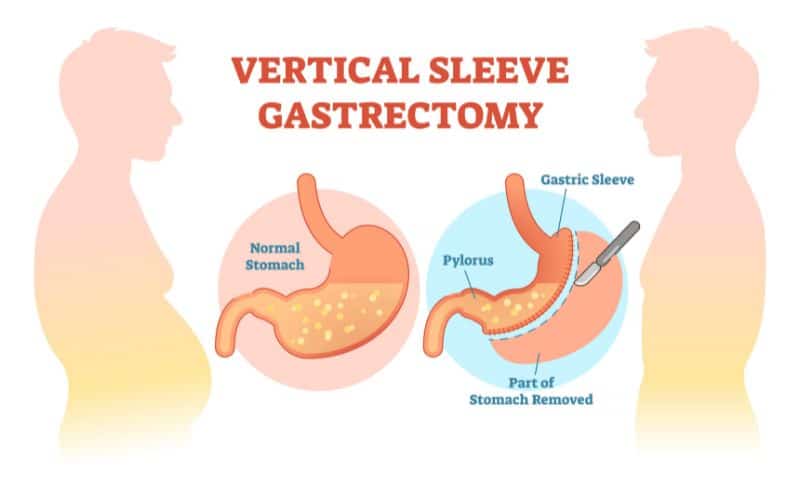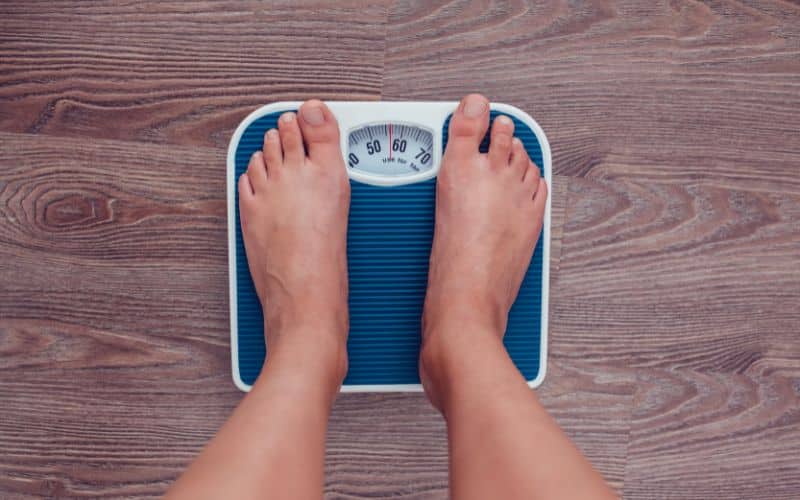Gastric sleeve surgery, also known as sleeve gastrectomy, is a weight loss surgery that involves removing a portion of the stomach to reduce its size. This procedure is known to be effective in helping people lose weight and improve their overall health. One of the most common questions asked by people considering gastric sleeve surgery is how much weight they can expect to lose.
According to various studies, the average weight loss after gastric sleeve surgery is around 60% of excess weight within the first year. This means that if a person has 100 pounds of excess weight, they can expect to lose around 60 pounds within the first year after surgery. However, it's important to note that weight loss can vary depending on individual factors such as age, gender, starting weight, and adherence to post-operative guidelines.
It's also important to understand that weight loss after gastric sleeve surgery is not guaranteed, and it's not a quick fix for obesity. The surgery is just one part of a comprehensive weight loss program that includes lifestyle changes such as healthy eating habits and regular exercise. It's important to work closely with a healthcare provider to develop a personalized weight loss plan that includes both surgical and non-surgical interventions.
Contents
Understanding Gastric Sleeve Surgery

Gastric sleeve surgery, also known as sleeve gastrectomy, is a weight loss surgery that involves the removal of a large portion of the stomach. The remaining portion of the stomach is formed into a sleeve-like shape, which results in a smaller stomach size and less food intake.
This surgery is typically recommended for individuals with a body mass index (BMI) of 40 or higher, or a BMI of 35 or higher with obesity-related health problems such as diabetes, high blood pressure, or sleep apnea. It is also recommended for those who have tried other weight loss methods without success.
Gastric sleeve surgery is performed under general anesthesia and typically takes around one to two hours. The surgeon makes small incisions in the abdomen and uses a laparoscope, a small camera, to guide the removal of a large portion of the stomach. The remaining portion of the stomach is then stapled together to form a sleeve-like shape.
After the surgery, patients usually stay in the hospital for one to two days and can resume normal activities within a few weeks. However, patients are advised to follow a strict diet and exercise plan to ensure successful weight loss and to prevent complications.
Overall, gastric sleeve surgery can result in significant weight loss and improvement in obesity-related health problems. However, it is important to note that the success of the surgery depends on the patient's commitment to a healthy lifestyle, including diet and exercise, after the surgery.
| Pros | Cons |
|---|---|
| Significant weight loss | Surgery risks |
| Improvement in obesity-related health problems | Strict diet and exercise plan |
| Short hospital stay | Long-term lifestyle changes |
| Less invasive than other weight loss surgeries | Irreversible surgery |
Average Weight Loss After Gastric Sleeve Surgery
Gastric sleeve surgery is a popular weight loss surgery that involves removing a large portion of the stomach to reduce its size. The surgery helps patients feel full after eating smaller amounts of food, leading to a reduction in calorie intake and weight loss.
The average weight loss after gastric sleeve surgery varies depending on the individual. However, according to Barilife, the average monthly weight loss after gastric sleeve surgery is 8 to 16 pounds. This weight loss continues after six months but at a slower rate.
The expected weight loss after gastric sleeve surgery can be calculated based on the patient's excess weight. According to Obesity Coverage, the average weight loss after gastric sleeve surgery is around 60% of excess weight after a year. For example, if a patient has an excess weight of 100 pounds, they can expect to lose around 60 pounds after one year of surgery.
It's important to note that gastric sleeve surgery is not a magic solution for weight loss. Patients are required to make significant lifestyle changes, including adopting a healthier diet and increasing physical activity, to maintain long-term weight loss. In addition, the surgery may not be suitable for everyone, and patients should discuss their options with a qualified healthcare professional.
In summary, the average weight loss after gastric sleeve surgery is around 8 to 16 pounds per month, and patients can expect to lose around 60% of their excess weight after one year of surgery. However, it's important to remember that the surgery is not a substitute for a healthy lifestyle and may not be suitable for everyone.
Factors Influencing Weight Loss

While gastric sleeve surgery can be an effective tool for weight loss, the amount of weight lost can vary from person to person. There are several factors that can influence weight loss after gastric sleeve surgery.
Starting Weight
One of the most significant factors that can affect weight loss after gastric sleeve surgery is a person's starting weight. Generally, people who have a higher starting weight will lose more weight after surgery than those who have a lower starting weight. According to the Mayo Clinic, people who have gastric sleeve surgery can expect to lose around 60% of their excess body weight within the first two years after surgery.
Diet and Exercise
While gastric sleeve surgery can help with weight loss, it is not a magic solution. People who undergo the surgery still need to make lifestyle changes, including following a healthy diet and engaging in regular exercise. These changes can help to maximize weight loss and maintain weight loss over time.
Age
Age can also be a factor in weight loss after gastric sleeve surgery. Generally, younger people tend to lose more weight after surgery than older people. This may be because younger people tend to have a higher metabolism, which can help with weight loss.
Health Conditions
Certain health conditions can also affect weight loss after gastric sleeve surgery. For example, people who have diabetes may experience more significant weight loss after surgery than those who do not have diabetes. This is because gastric sleeve surgery can help to improve insulin sensitivity, which can lead to better blood sugar control and weight loss.
Compliance with Post-Op Instructions
Finally, compliance with post-operative instructions can also play a role in weight loss after gastric sleeve surgery. Following the surgery, patients will receive instructions on how to care for themselves, including dietary guidelines and exercise recommendations. Following these instructions can help to maximize weight loss and improve overall health outcomes.
Short-Term Weight Loss

After undergoing gastric sleeve surgery, patients can expect to experience significant weight loss in the short term. In this section, we will discuss the average weight loss that patients can expect during the first six months after surgery.
First Month Post-Surgery
During the first month following gastric sleeve surgery, patients can expect to lose a significant amount of weight. On average, patients can expect to lose up to 25% of their excess weight during this time. For example, a patient who is 100 pounds overweight would lose around 25 pounds in the first month after surgery.
Three Months Post-Surgery
After three months, patients can expect to continue losing weight, albeit at a slightly slower rate. On average, patients can expect to lose up to 40% of their excess weight by the end of the third month. For example, a patient who is 100 pounds overweight would have lost around 40 pounds by the end of the third month after surgery.
Six Months Post-Surgery
By the end of six months after surgery, patients can expect to have lost a significant amount of weight. On average, patients can expect to lose up to 60% of their excess weight by the end of the sixth month. For example, a patient who is 100 pounds overweight would have lost around 60 pounds by the end of the sixth month after surgery.
It is important to note that these numbers are just averages, and individual results may vary. Additionally, weight loss may not be consistent from month to month, and some patients may experience plateaus or temporary setbacks. However, with proper diet and exercise, patients can expect to continue losing weight in the long term.
Long-Term Weight Loss
Gastric sleeve surgery is a popular weight loss procedure that involves removing a portion of the stomach, leaving behind a sleeve-shaped pouch. This limits the amount of food that can be consumed, leading to weight loss. But what is the average weight loss after gastric sleeve surgery in the long term? Let's take a look.
One Year Post-Surgery
Patients who undergo gastric sleeve surgery can expect to lose an average of 60% of their excess weight within one year [1]. This translates to an average monthly weight loss of 8 to 16 pounds [2]. During the first month, patients can expect to lose up to 25% of their excess weight, and by the end of the first year, up to 80% of the excess weight is lost [4].
Two Years Post-Surgery
Patients who undergo gastric sleeve surgery can expect to lose up to 75% of their excess weight within two years [3]. The weight loss rate is around 2 to 3 pounds per week, and the resolution of comorbidities occurs in just one to two years following weight loss surgery [3].
Three Years Post-Surgery
There is limited data on the average weight loss after gastric sleeve surgery beyond two years. However, studies have shown that patients who maintain their lifestyle changes can continue to lose weight and keep it off [1]. It is important to note that the amount of weight lost will vary from person to person and depends on several factors, including diet, exercise, and follow-up care.
In conclusion, gastric sleeve surgery can provide significant long-term weight loss for patients who are committed to making lifestyle changes. Patients can expect to lose an average of 60% of their excess weight within one year and up to 75% within two years. Beyond two years, weight loss can continue with proper diet, exercise, and follow-up care.
Potential Complications and Risks

Like any surgery, gastric sleeve surgery carries potential risks and complications. However, the risks are generally low, and most people experience few problems.
Some potential complications that can occur after gastric sleeve surgery include:
- Bleeding: This is a rare complication but can occur in the first few days after surgery. If it does occur, it may require a blood transfusion or additional surgery.
- Infection: Infection can occur after any surgery. Signs of infection include fever, redness, swelling, and discharge from the incision site.
- Leakage: Leakage can occur where the stomach was stapled or sutured during surgery. This can cause serious complications, including infection, abscesses, and sepsis.
- Blood clots: Blood clots can form in the legs or lungs after surgery. This is a rare complication, but it can be life-threatening.
- Gastroesophageal reflux disease (GERD): Some people develop GERD after gastric sleeve surgery. Symptoms of GERD include heartburn, regurgitation, and difficulty swallowing.
- Weight regain: While gastric sleeve surgery is an effective weight loss tool, some people may regain weight over time. This can happen if they do not follow a healthy diet and exercise regularly.
It is important to note that the risks associated with gastric sleeve surgery are generally low, and most people experience few complications. However, it is important to discuss the potential risks and benefits of the surgery with your doctor to determine if it is the right option for you.
Managing Expectations and Setting Goals
It is important to have realistic expectations when it comes to weight loss after gastric sleeve surgery. While weight loss results vary from person to person, it is important to remember that the surgery is a tool to help you reach your weight loss goals, but it is not a magic solution.
It is recommended to set achievable goals and celebrate small victories along the way. For example, setting a goal to lose 10% of your excess weight within the first 3-6 months after surgery, and then setting a new goal for the next 3-6 months can help keep you motivated and on track.
It is also important to remember that weight loss is not the only measure of success after surgery. Improvements in overall health, such as lower blood pressure, improved blood sugar levels, and reduced joint pain, are also important indicators of success.
Below is a table that shows the average monthly weight loss after gastric sleeve surgery, based on various studies:
| Time After Surgery | Average Monthly Weight Loss |
|---|---|
| 1 month | 10-15% of excess weight |
| 3 months | 30-40% of excess weight |
| 6 months | 50-60% of excess weight |
| 12 months | 65-70% of excess weight |
| 18 months | 70-75% of excess weight |
| 24 months | 65-70% of excess weight |
It is important to note that these are averages and individual results may vary. It is also important to follow a healthy diet and exercise regularly to achieve the best results.
In summary, managing expectations and setting achievable goals are important for success after gastric sleeve surgery. Celebrate small victories, focus on overall health improvements, and follow a healthy lifestyle to achieve the best results.
Role of Diet and Exercise

While gastric sleeve surgery can be an effective tool for weight loss, it is important to remember that it is not a magic solution. A healthy diet and regular exercise are still crucial components in achieving and maintaining weight loss.
Following the surgery, patients will need to follow a strict diet plan that is divided into several phases. These phases will gradually introduce different types of foods, starting with liquids and progressing to soft foods and eventually solid foods. It is important to follow this plan closely to ensure proper healing and to avoid complications.
In addition to following the post-surgery diet plan, patients should also focus on making long-term dietary changes. This may include increasing protein intake, reducing carbohydrate intake, and incorporating more fruits and vegetables into their diet. Patients should also aim to consume smaller, more frequent meals throughout the day to avoid overeating.
Exercise is also an important component of weight loss after gastric sleeve surgery. Regular physical activity can help to boost metabolism, burn calories, and improve overall health. Patients should aim to incorporate both aerobic exercise and strength training into their routine. This may include activities such as walking, cycling, swimming, and weight lifting.
It is important to note that patients should not begin exercising until they have been cleared by their doctor. Patients should also start slowly and gradually increase the intensity and duration of their workouts over time.
Overall, while gastric sleeve surgery can be a powerful tool for weight loss, it is important to remember that it is not a quick fix. A healthy diet and regular exercise are still crucial components in achieving and maintaining weight loss.
Conclusion
In conclusion, gastric sleeve surgery is an effective weight loss option for those who have struggled with obesity. Average monthly weight loss after gastric sleeve surgery can range from 8 to 16 pounds, with weight loss continuing after six months but at a slower rate. Patients can expect to lose up to 25% of their excess weight during the first month, up to 40% after three months, up to 60% after six months, and up to 80% after 12 months.
It is important to note that weight loss results can vary depending on factors such as individual metabolism, diet, exercise habits, and overall health. Additionally, gastric sleeve surgery is a major procedure that requires careful consideration and consultation with a qualified healthcare professional.
While gastric sleeve surgery can lead to significant weight loss, it is not a quick fix or a cure-all solution. Patients must be committed to making long-term lifestyle changes, including adopting a healthy diet and regular exercise routine, to maintain their weight loss and improve their overall health.
Overall, gastric sleeve surgery can be a life-changing procedure for those struggling with obesity, but it is important to approach it as part of a comprehensive weight loss plan and to work closely with a healthcare professional to achieve optimal results.





